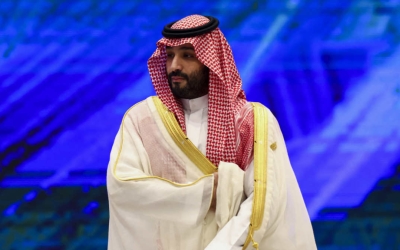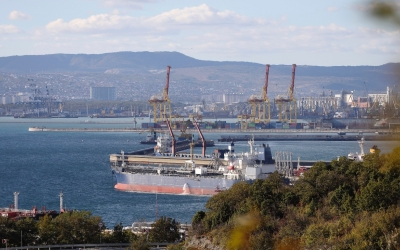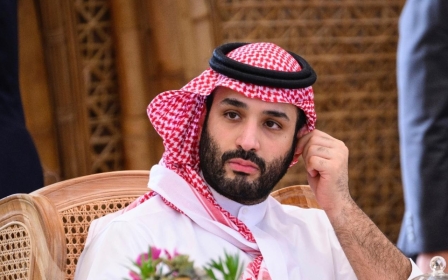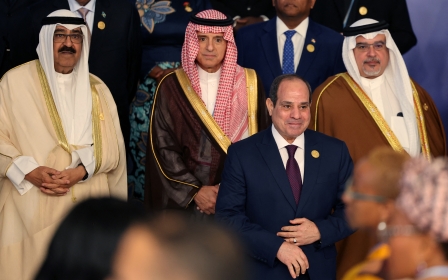Saudi Arabia to ramp up oil investments in China as it competes with Russia

Saudi Arabia’s state-owned oil company, Aramco, will plough ahead with new investments in China, despite posting a 38 percent drop in profit as lower oil prices and production cuts bite.
Aramco announced on Monday that net profit fell to about $30.08bn in the second quarter ending 30 June, compared to $48.44bn in the same period last year.
The kingdom enjoyed a revenue windfall after Russia’s invasion of Ukraine helped push crude prices higher.
Saudi Arabia was the fastest-growing economy in the G20 last year. Meanwhile, Aramco briefly overtook Apple as the world’s most valuable public company.
But Aramco’s drop in profit is the latest sign that falling crude prices and a series of unilateral production cuts are cooling the kingdom's economy. In July, the IMF downgraded Saudi Arabia’s growth forecast from 3.2 percent to 1.9 percent.
New MEE newsletter: Jerusalem Dispatch
Sign up to get the latest insights and analysis on Israel-Palestine, alongside Turkey Unpacked and other MEE newsletters
Brent is down about 25 percent from a year ago and Saudi Arabia’s oil exports are down 40 percent from a year ago.
Despite the drop in profit, Aramco CEO Amin Nasser said in a press call on Monday that the state-owned energy giant was committed to expanding its footprint in China, Saudi Arabia’s biggest oil customer, but a country where Riyadh is seeing increased competition with Russia.
'China projects in pipeline'
“China represents an important market for us, not in terms of only crude placements but also in terms of chemicals growth. There is a number of investments in China in the pipeline that we are currently evaluating and which we will announce in due course,” Nasser said.
Saudi Arabia has invested heavily in Chinese refineries. Last month, Aramco completed its purchase of a 10 percent stake in China's Rongsheng Petrochemical company for about $3.6bn. The deal will see Aramco supply about 480,000 barrels per day of additional crude oil to Rongsheng-affiliated refineries.
Saudi Arabia, along with other Gulf states, is ramping up investments in order to churn out more crude and petroleum products, at a time when western companies are scaling back new production amid concerns about western governments' climate mandates and future demand.
Saudi Arabia's energy minister, Abdulaziz bin Salman, has famously vowed the kingdom would be "the last man standing" in the energy market and extract “every molecule of hydrocarbon” it possesses.
Saudi Arabia’s Crown Prince Mohammed Bin Salman is pushing a plan to diversify his kingdom’s economy away from its reliance on fossil fuels with an eye towards the future when demand drops, but right now the kingdom needs oil revenue.
The IMF says Saudi Arabia needs Brent crude prices above $80 per barrel to balance its budget and devote funds to mega-projects like Neom and Red Sea island developments.
On Monday, Aramco announced that it would boost its dividend to $29.4bn this quarter up from $18.8bn the same time last year. Aramco is about 98 percent owned by the Saudi government and the kingdom’s sovereign wealth fund, so the dividend represents a key cash infusion for the Saudi government.
Saudi Arabia and Russia vying for China
Oil prices have risen substantially this summer, with Brent crude trading at $85.49 a barrel Monday. Analysts have attributed the rise to increasing summer demand amid signs the global economy may avoid a recession, and efforts by oil producers to choke crude supplies.
But on the supply side, analysts and energy experts told Middle East Eye that Saudi Arabia has been doing most of the heavy lifting within an alliance of oil producers dubbed Opec+ led by Riyadh and Moscow.
Aramco’s commitment to investing further in China comes as Saudi Arabia faces a falling market share in Asia to Russia, whose oil sales to India have already surpassed the total crude purchased from Saudi Arabia, the UAE, Iraq, and the US.
Saudi Arabia and Russia are vying for the top spot as China’s main oil supplier.
Adi Imsirovic, director of Surrey Clean Energy, and former head of oil at Gazprom's overseas trading arm, previously told MEE that competition for Chinese market share is one of the most sensitive issues for the kingdom.
Russia turned to China as a customer because Europe shunned its oil after the invasion of Ukraine. In a global rewiring of the energy trade, Saudi Arabia picked up Russia’s market share in Europe, but because of its limited growth potential and western climate goals, experts say Asia is the big prize for oil sales.
“You don’t want to be losing market share in Asia to sell into Europe,” Imsirovic said.
Middle East Eye delivers independent and unrivalled coverage and analysis of the Middle East, North Africa and beyond. To learn more about republishing this content and the associated fees, please fill out this form. More about MEE can be found here.






